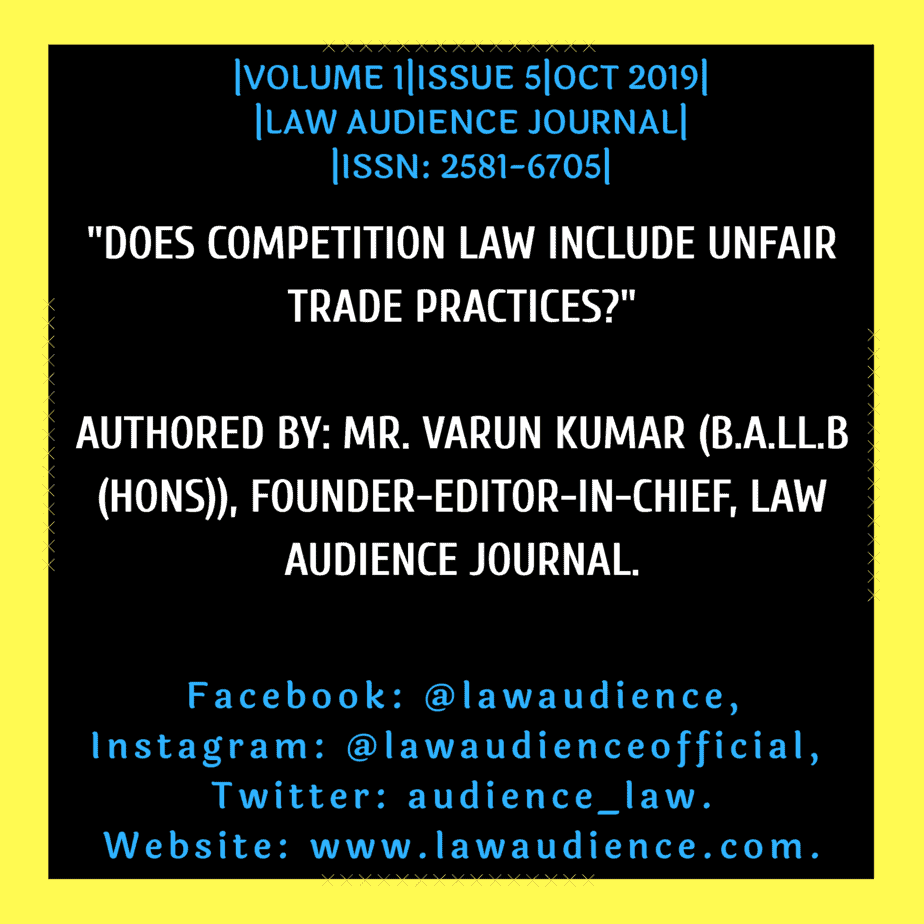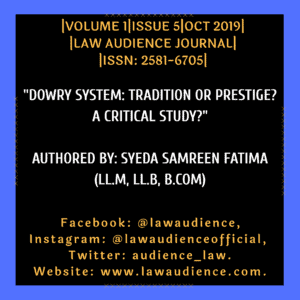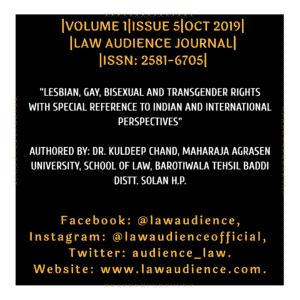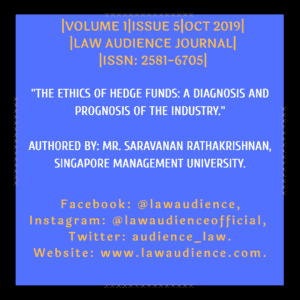Authored By: Mr. Varun Kumar (B.A.LL.B (Hons), Founder-Editor-In-Chief, Law Audience Journal.
LIST OF ABBREVIATIONS:
1. CCI. | COMPETITION COMMISSION OF INDIA. |
2. CA, 2002. | COMPETITION ACT, 2002. |
3. MRTP ACT. | MONOPOLIES AND RESTRICTIVE TRADE PRACTICES ACT, 1969 |
4. CPA, 1986. | CONSUMER PROTECTION ACT, 1986. |
I. ABSTRACT:
In this article, the author will be discussing whether Competition Law, i.e., Competition Act, 2002, includes the notion of Unfair Trade Practices or not. It has been noted that the Competition Commission of India (hereinafter referred as CCI) receives a lot of cases or information u/s 19[1] of the Competition Act, 2002 (hereinafter referred as CA, 2002), where the informant alleges that the opposite party is indulged in some Unfair Trade Practices and request the CCI to take some strict actions against the opposite party. Under the CA, 2002, the person who submits ‘information’ is known as ‘informant’ and against whom such information is submitted is known as ‘opposite party’. To clear the existing confusion the author would like to discuss the concept in detail.
II. BACKGROUND:
The CA, 2002, has replaced the earlier Act, i.e., Monopolies and Restrictive Trade Practices Act, 1969 (hereinafter referred as MRTP Act)[2]. Before the establishment of the CCI, the MRTP Commission was responsible to maintain fair competition in the market by eliminating the Restrictive Trade Practices[3] from the market. The CCI replaced the MRTP Commission on 1st Sep 2009 because the provisions of MRTP Act, 1969, and the provisions of CA, 2002, conflicted with each other[4]. To remove this conflict the Ministry of Corporate Affairs released an official notification in August 2019 stating that from this particular date (1st Sep 2009) the MRTP Commission will be replaced by the CCI. The notification also made it clear that the MRTP Commission will continue to deal with all the pending cases filed under the MRTP Act, 1969, before 1st Sep 2009, for a period of 2 years (no new case will be accepted under the MRTP Act, 1969). After the expiration of 2 years all the pending cases relating to the Monopolistic or Restrictive Trade Practices will be dealt by the Appellate Tribunal established under the CA, 2002[5], and all the cases pertaining to Unfair Trade Practices will be transferred to the National Consumer Disputes Redressal Commission[6] established under the Consumer Protection Act, 1986 (hereinafter referred as CPA, 1986)[7]. At present, CCI is empowered to maintain fair competition in the market and to maintain fair competition the CCI has been provided with great powers under the CA, 2002. The provisions relating to Unfair Trade Practices were included under the MRTP Act, 1969 (Chapter IV, Part B, Sections 36A to 36E). At that time the MRTP Commission was responsible to eliminate the Unfair Trade Practices from the market. It means at that time MRTP Commission was handing two main issues namely, (i) maintaining fair Competition in the market by eliminating the Restrictive Trade Practices; (ii) eliminating the Unfair Trade Practices from the market. But on the other hand CA, 2002, does not contain any provision relating to the Unfair Trade Practices. At present, the provisions relating to the Unfair Trade Practices are included under the CPA, 1986.
III. DEFINITIONS OF UNFAIR TRADE PRACTICES:
a) UNDER MRTP, ACT, 1969:
Section 36A of the MRTP Act, 1969, dealt with the concept of Unfair Trade Practices and it reads as follow[8]:
Unfair Trade Practice means any practice which for the promotion of sale and sale of goods adopts any unfair method including any of the following:
- falsely signifies that the product is of good quality and standard;
- falsely sells the second hand and re-used products as brand new products;
- falsely signifies that the product is approved by the competent authority;
- falsely signifies that product comes with warranty or guarantee;
b) UNDER CPA, 1986[9]:
After repealing the MRTP Act, 1969, all the provisions relating to Unfair Trade Practices were included under the CPA, 1986. Section 2(r)(1) of the Act deals with the concept of Unfair Trade Practices. The CPA, 1986, has adopted the same definition of Unfair Trade Practices which was included u/s 36A[10] of the MRTP Act, 1969.
IV. UNFAIR TRADE PRACTICES UNDER MRTP, ACT, 1969:
As discussed above that the MRTP Commission under the MRTP Act was empowered to take actions against the Unfair Trade Practices. All the provisions relating to Unfair Trade Practices were included under Sections 36A to 36E[11]. Under the MRTP Act, the loss was not an essential requirement to take actions against Unfair Trade Practices[12]. If the quality of the product was not good or the product was defective then the person could take actions against the sellers of such goods for Unfair Trade Practices under the Provisions of the MRTP Act, 1969[13].
Section 36B of the MRTP Act, 1969, gave wide powers to the MRTP Commission to inquire into Unfair Trade Practices in the following manner namely[14]:
- the MRTP Commission could take action against such Unfair Trade Practices based on the Information received by a person under the provisions of section 36B;
- the MRTP Commission could take action against such Unfair Trade Practices based on the reference made to it by the State Government or the Central Government;
- MRTP Commission could take action against such Unfair Trade Practices on its own motion (Suo Moto) also;
If the Prima Facie case is made out against the respondent then it was a sufficient cause or reason for the MRTP Commission to take action against the respondent under the provisions of the Section 36B of the MRTP Act, 1969[15]. Under section 36C of the MRTP Act, 1969, the MRTP Commission before initiating any process against the respondent could direct the Director General (DG) to conduct a preliminary investigation against the respondent[16].
Section 36D of the MRTP Act, 1969, gave certain important powers to the MRTP Commission to inquire into Unfair Trade Practices[17]. Section 36E[18] of the MRTP Act, 1969, provided that, all the powers given to the MRTP Commission u/s 37[19] of the MRTP Act, 1969, can be exercised by the MRTP Commission while conducting an inquiry into Unfair Trade Practices. So from the above-discussed provisions, it becomes clear that the MRTP Commission was given numerous powers under the MRTP Act, 1969, to deal with the issue of Unfair Trade Practices.
V. UNFAIR TRADE PRACTICES UNDER CA, 2002:
From the above discussion, it becomes clear that the provisions relating to the Unfair Trade Practices are not included in the CA, 2002. But, still, numbers of complaints are being filed with the CCI for Unfair Trade Practices on the ground that earlier Commission, i.e., the MRTP Commission, was empowered to take actions against such Unfair Trade Practices. So after replacing the MRTP Commission with CCI, it becomes eligible to entertain cases pertaining to Unfair Trade Practices, which is not a valid ground for filing such information or cases with the CCI u/s 19 of the CA, 2002. Unfair Trade Practice means any practice which is adopting any unfair mean or method of selling the goods and services.
Such Unfair Trade Practices does not fall under the purview of Competition Law and CCI does not look or inquire into such Unfair Trade Practices. The main motive of CCI is to prohibit any agreement or practice which is likely to have an appreciable adverse effect on competition in India.
a) CCI ON UNFAIR TRADE PRACTICES:
In Re: Sh. Ravi Beriwala v. Lexus Motors Ltd[20], in this case, the Commission in Para No. 11 of the order clarified that, the allegations pertaining to unfair trade practices are not per se covered under the Act. Therefore, the commission examined the allegations from the perspective of Section 4 of the CA, 2002.
In Re: M/s Kiran Enterprise v. M/s Abbott Healthcare Pvt. Ltd[21], even in this case the informant alleged that the opposite party is indulged in some Unfair Trade Practices. But, however, after reviewing the material on record the CCI decided to review the case from the perspective of sections 3 & 4 of the CA, 2002. The CCI in its final order held that the opposite party has not violated any of the provisions of sections 3 & 4 of the CA, 2002.
In Re: M/s Indiacan Education Pvt. Ltd v. M/s Aldine Ventures Pvt. Ltd & others[22], informant filed a case against the opposite party u/s 19 of the CA, 2002, on the ground that the alleged conduct of the opposite party amounts to Unfair Trade Practices and the alleged conduct of the opposite party is likely to have an appreciable adverse effect on the competition in India. But again CCI reviewed the matter by the provisions of sections 3 & 4 of the CA, 2002, and held that the opposite party does hold any dominant position in the market. So the question of abusing the dominant position does not arise.
From the above-discussed cases, it becomes clear that CCI does not investigate Unfair Trade Practices. What it does is that it looks into anti-competitive agreements (sec 3 of the CA, 2002) and abuse of dominant position (sec 4 of the CA, 2002) u/s19 of the CA, 2002.
b) ANTI-COMPETITIVE AGREEMENT (SEC 3) AND ABUSE OF DOMINANT POSITION (SEC 4):
From the above-mentioned facts, circumstances and cases it becomes clear that the CCI receives numerous information or cases u/s 19 of the CA, 2002, stating that the opposite party is indulged in some Unfair Trade Practices. There is a huge difference between Unfair Trade Practices and Anti-Competitive Agreements and Abuse of Dominant Position.
If the CCI receives any information u/s 19 of the CA, 2002, then it’ll look into the following questions namely[23],
- Whether the parties are involved in any anti-competitive agreement or not?
- Whether the parties are abusing its dominant position (if any) or not?
The CCI will not look into whether the parties are involved in Unfair Trade Practices or not because that falls under the purview of CPA, 1986.
Anti-Competitive Agreements (Sec 3, of the Act)[24]:
Section 3 of the CA, 2002, clearly says that no enterprise or association of enterprise or person or association of person shall enter into any agreement which is likely to cause an appreciable adverse effect on the competition in India. Any agreement which in any manner determines the price of sale or purchase or restricts or limits the production of goods is anti-competitive agreement in terms of section 3 of the CA, 2002. Such anti-competitive agreement must be between two competitors. If it is not between two competitors then it cannot be regarded as anti-competitive agreement in terms of section 3 of the CA, 2002.
Abuse of Dominant Position (sec 4)[25]:
Section 4 of the CA, 2002, deals with the concept of abuse of dominant position. This section clearly states that no enterprise or association of enterprise or group of enterprise or association of persons shall abuse its dominant position in the relevant market. For the applicability of the provisions of section 4, the opposite party must be a dominant player in the market and being a dominant player in the market abusing its dominant position.
The opposite party can abuse its dominant position in the following ways namely[26],
- By charging discriminatory or predatory prices;
- By limiting the production of goods;
- By imposing the irrelevant conditions on the production of goods;
- By putting barriers for the new entrants in the relevant market;
If the CCI finds that the opposite party is abusing its dominant position and involved in any anti-competitive agreement then it will entertain the case as per the provisions of section 19 of the CA, 2002. If the provisions of sections 3 & 4 are not applicable then CCI will reject the case as per the provisions of section 26(2)[27] of the CA, 2002. But in no manner, CCI will into look into any Unfair Trade Practices u/s 19 of the CA, 2002. CCI does maintain a check & balance on those practices or agreements which are likely to cause an Appreciable Adverse Effect on Competition in India.
VI. CONCLUSION:
After discussing the whole concept in detail the author would like to conclude that at present many people file information with CCI u/s 19 of the CA, 2002, on the ground that the opposite is indulged in Unfair Trade Practices. But from the above-discussed cases, it is clear that CCI u/s 19 of the CA, 2002, will examine the case based on the anti-competitive agreement or abuse of dominant position rather than going into the question of Unfair Trade Practices. Under the earlier law, i.e., MRTP Act, 1969, the MRTP Commission was empowered to take strict actions against the enterprises or persons who are involved in Unfair Trade Practices. But the present law, i.e., CA, 2002, in no manner deals with the concept of Unfair Trade Practices. The present Competition Law prohibits anti-competitive agreements and abuse of dominant position and other things mentioned under the CA, 2002. If any person or enterprise contravenes the provisions of sections 3 & 4 of the CA, 2002, he or such enterprise will attract a heavy penalty under the provisions of the CA, 2002.
[1] Sec 19 (Inquiry into certain agreements and dominant position of enterprise), Competition Act, 2002, No. 13, Acts of Parliament, 2002 (India).
[2] Competition Commission of India, http://www.mca.gov.in/MinistryV2/cci.html.
[3] Sec 2(o) (Restrictive Trade Practice), Monopolies and Restrictive Trade Practices Act, 1969, No. 54, Acts of Parliament, 1969 (India).
[4] supra note 2.
[5] Subs by Act 39 of 2009, Section 2(b)(i) w.e.f 14-10-2009, for” after the expiry of two year referred to in the proviso to the Subsection (i) of sec 61 of Competition Act, 2002”
[6] Sec 9(c) (Establishment of Consumer Disputes Redressal Agencies), The Consumer Protection Act, 1986, No. 68, Acts of Parliament, 1986 (India).
[7] Subs. by Act 39 of 2009, Section 2(c)(i) w.e.f 14-10-2009.for “on or before the expiry of two years referred to in the proviso to subsection (1) of sec 61 of Competition Act, 2002”.
[8] Sec 36A (Definition of Unfair Trade Practice), Monopolies and Restrictive Trade Practices Act, 1969, No. 54, Acts of Parliament, 1969 (India).
[9] Sec 2(r)(1) (Unfair Trade Practice), The Consumer Protection Act, 1986, No. 68, Acts of Parliament, 1986 (India).
[10] supra note 8.
[11] (Chapter IV, Part B), Monopolies and Restrictive Trade Practices Act, 1969, No. 54, Acts of Parliament, 1969 (India).
[12] Director General of Investigation and Registration v. Cement Corporation of Gujarat Ltd, (1994) 80 Comp Cas 15 (MRTPC) (India).
[13] In Re: Shree Raj Travels & Tours Pvt. Ltd, (1994) 79 Comp Cas 408 (MRTPC) (India).
[14] Sec 36B (Inquiry into unfair trade practices by Commission), Monopolies and Restrictive Trade Practices Act, 1969, No. 54, Acts of Parliament, 1969 (India).
[15] Joytirmoy Investments Pvt. Ltd. v. New Delhi Municipal Committee (1994) 80 Comp Cas 878 (MRTPC) (India).
[16] Sec 36C (Investigation by Director General before an issue of process in certain cases), Monopolies and Restrictive Trade Practices Act, 1969, No. 54, Acts of Parliament, 1969 (India).
[17] Sec 36D (Powers which may be exercised by the Commission inquiring into an unfair trade practice), Monopolies and Restrictive Trade Practices Act, 1969, No. 54, Acts of Parliament, 1969 (India).
[18] Sec 36E (Power relating to restrictive trade practices may be exercised or performed in relation to unfair trade practices), Monopolies and Restrictive Trade Practices Act, 1969, No. 54, Acts of Parliament, 1969 (India).
[19] Sec 37 (Investigation into restrictive trade practices by Commission), Monopolies and Restrictive Trade Practices Act, 1969, No. 54, Acts of Parliament, 1969 (India).
[20] Case No. 79 of 2016, available at https://www.cci.gov.in/sites/default/files/79%20of%202016%20Order%2026%282%29.pdf.
[21] Case No. 91 of 2016, available at https://www.cci.gov.in/sites/default/files/case%2091%20of%202016.pdf.
[22] Case No. 71 of 2016, available at https://www.cci.gov.in/sites/default/files/26%282%29%20Order%20in%20Case%20No.%2071%20of%202016.pdf.
[23] supra note 1.
[24] Sec 3 (Anti-Competitive Agreements), Competition Act, 2002, No. 13, Acts of Parliament, 2002 (India).
[25] Sec 4 (Abuse of Dominant Position), Competition Act, 2002, No. 13, Acts of Parliament, 2002 (India).
[26] Sec 4(2)(b) (Abuse of Dominant Position), Competition Act, 2002, No. 13, Acts of Parliament, 2002 (India).
[27] Sec 27(2) (Procedure for inquiry under section 19), Competition Act, 2002, No. 13, Acts of Parliament, 2002 (India).



